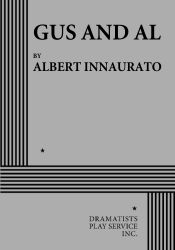
THE STORY: As the play begins Al (in reality the author himself) has had another opening—and another crushing set of bad notices. Discouraged and wishing he were elsewhere, Al tinkers with a bizarre time machine concocted by his roommate, Kafka (a gorilla), and suddenly his wish is granted as he finds himself, dazed and dislocated, in the parlor of Gustav Mahler, one of his idols. The place is Vienna, the time 1900, and Mahler too is struggling to establish himself in the face of critical animosity and public indifference. Once the shock of Al’s outlandish arrival has been absorbed, he and “Gus” find that they are kindred spirits, and soon Al becomes a member of the household, along with Mahler’s smitten housekeeper, Natalie; his young sister, Justine; and eventually the beautiful, free-spirited Alma, who is destined to become Mahler’s wife (much to Natalie’s annoyance). Filled with subtly revealing and frequently hilarious scenes, the play is both a wry comment on the artist’s lot and also a fascinating exploration of the creative mind and spirit. Along the way there is even a brief visit with Sigmund Freud (who is trying to help Mahler untangle his romantic confusion) and the latter’s gardener (whom Al recognizes as his own grandfather as a youth) before Al is returned to the present as abruptly as he left it—perhaps not a happier, but certainly a wiser young man.
A clever, funny and brilliantly executed fantasy in which a disheartened contemporary playwright (Albert Innaurato), smarting at the obtuse and destructive criticism to which his work is subjected, is suddenly projected back in time to Vienna in 1900, to compare fates with another misunderstood artist—the composer Gustave Mahler.
“The blend of mocking autobiography and freewheeling fantasy makes for a bubbly brew…” —New York Magazine.
“…it begins with a sense of genuine malaise and it ends in a spirit of eloquent affirmation. This is a heartening journey for a play—or a playwright—to make.” —New York Daily News.
“His fantasy and jokes are irresistible…GUS AND AL’s mixture of drollery, satire, and anguish is commandingly balanced by Innaurato.” —Village Voice.
